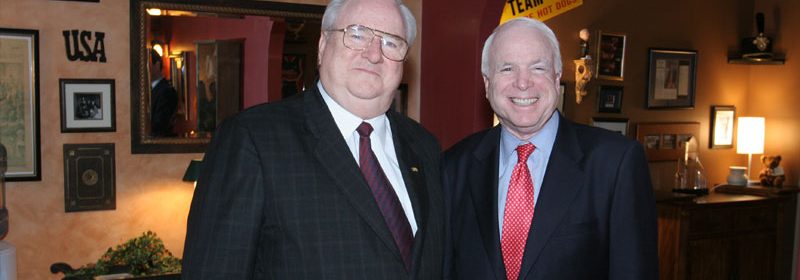Opinion: In Remembrance of Senator McCain

John McCain left this life in the same way he lived it — on his own terms and with his country in mind.
Senator McCain died August 25, leaving his family and his nation to reflect on 60 years of service. During his military and political careers, McCain demonstrated courage, acted on his convictions and sacrificed for the country he loved.
While flying an attack mission as a Navy pilot during the Vietnam War, McCain was shot down and taken as a prisoner. For five and a half years, he endured interrogations, solitary confinement and extensive physical torture. McCain later spoke of his ordeal with U.S. News & World Report. He was deprived of food, his weight plummeted to 105 pounds and he was beaten by prison guards daily.
Former President Barack Obama, McCain’s opponent in the 2008 presidential election, said of McCain, “Few of us have been tested the way John once was, or required to show the kind of courage that he did.”
McCain’s father was a decorated Navy admiral, who commanded a lot of respect. Due to his father’s status, McCain was given an opportunity to return to America before the other prisoners. He declined, choosing to stay in the camp until every prisoner who was captured before him were released. McCain eventually agreed to sign a confession for “war crimes against the Vietnamese” — a decision he would regret for the rest of his life.
As a member of Congress, McCain was a self-proclaimed “maverick,” emphasizing his personal convictions over party coalitions.
His speeches and voting record showed his commitment to put people over politics. In July 2017, as debate raged over an attempted replacement to the Patient Protection and Affordable Care Act, McCain took the floor and challenged his contemporaries to work together, even when they disagreed.
“I hope we can again rely on humility, on our need to cooperate … and by so doing better serve the people who elected us,” McCain said.
In November, McCain returned to the Senate and was the decisive vote against replacing the health care law.
Former President George W. Bush took notice of these convictions in the statement he released upon McCain’s death.
“John McCain was a man of deep conviction and a patriot of the highest order. He was a public servant in the finest traditions of our country,” Bush said.
McCain gave the commencement address at Liberty University in 2006, and he spoke of the common ground that Americans all share.
“Americans deserve more than tolerance from one another,” McCain said. “We deserve each other’s respect, whether we think each other right or wrong in our views, as long as our character and our sincerity merit respect.”
During his fight with brain cancer, McCain stayed in Washington, fulfilling his congressional obligations as best he could.
As his final days neared, McCain’s thoughts turned once again to the nation he served. He was proud of his country, reflective on the past and optimistic toward the future. McCain wrote a farewell letter from his deathbed.
“Fellow Americans’ – that association has meant more to me than any other. I lived and died a proud American … Americans never quit. We never surrender. We never hide from history. We make history,” McCain wrote.
Through his service, McCain etched his name into American history. His legacy will remain an example for generations to come. McCain spoke at the October 2017 commencement ceremony for the Naval Academy and said, “My time is slipping by. Yours is fast approaching. You will know where your duty lies. You will know.”
